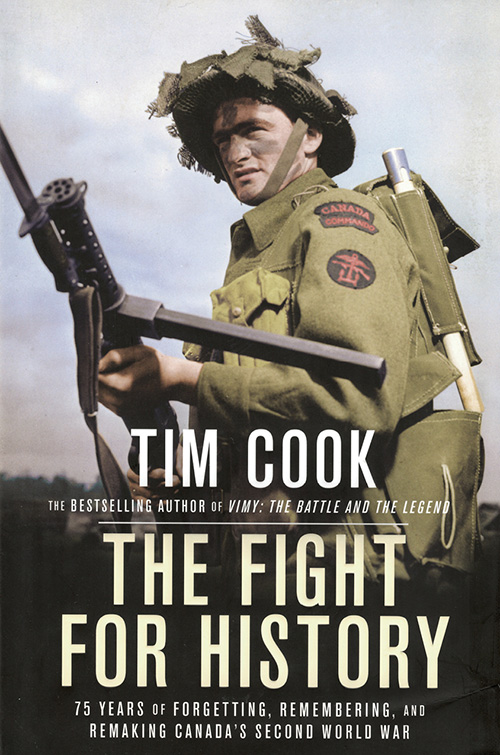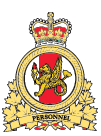Book Reviews

The Fight for History: 75 Years of Forgetting, Remembering, and Remaking Canada’s Second World War
by Tim Cook
Toronto: Allen Lane, 2020, $27.58
ISBN 9780735238336
For more information on accessing this file, please visit our help page.
Reviewed by Joel Watson
The Fight for History should come with a warning: “DO NOT READ BEFORE BED,” as each turn of the page gets the blood boiling, and sleep does not come easily afterwards. While the book overtly deals with the failure to remember the Canadians who defeated German, Italian, and Japanese tyranny, there is also a disturbing undercurrent of a Canada refusing to accept that it has become a serious country in a serious world. Tim Cook, one of Canada’s preeminent and best-selling military historians, methodically exposes Canada’s failure to remember and learn from the Second World War, but The Fight for History is not just the fight to remember the past. It is a fight to educate a future generation of citizens about Canada’s responsibilities in a harsh world. It is essential reading for those concerned about keeping Canada strong and free.
Cook begins with a sad reminder of why Canadians fought the Second World War, since many have either forgotten or have not been taught the horrors of the mid-20th Century, mainly because Canada’s martial history has fallen out of favour. Concentration camps and death marches may come as a shock to those exposed only to Canada’s own historical failings, but no more so than discovering that the “Peaceable Kingdom” had a bloody reputation from the First World War. Canada was a serious war-fighting nation when it landed as one of only three designated Armies in both Sicily and Normandy between the British and the Americans, when it trained Commonwealth aircrews en masse, and when it took charge of the North Atlantic Convoy Routes. While Canadian students are taught a narrative of defeat and failing, of Dieppe and Japanese-Canadian Internment, they are not taught that Canada fought toe-to-toe with the most fanatical SS Panzer forces Germany could throw at the Allies, and defeated them, in addition to becoming an industrial and maritime powerhouse. Absent is recognition of the horrors of Axis conquest and the unfathomable treatment of Canadian Prisoners of War. It seems that only the Dutch remember that Canadians liberated them from horror and starvation through miserable waterborne fighting, few Canadians do. Even fewer remember that Canadians were among those who discovered the Bergen-Belsen Concentration Camp, where almost 30,000 corpses were found together with 60,000 walking dead, and yet the CBC, through its taxpayer funded programing, had Canadians ‘second guessing’ the need to bomb Germany. Cook argues that not until historians like Terry Copp and Jack Granatstein, and veterans like Cliff Chadderton and Garth Webb took it upon themselves to reveal Canada’s Second World War history did Canada’s contribution begin to get its due. While writing about contested memory and the politics of memorials, Cook convincingly argues that Canada’s Second World War was not a failure as it is taught, but a “Necessary War” where Canada played a vital role that must be remembered holistically in order to secure a better future.
The story of how Canada forgot and then remembered its Necessary War is, as Cook puts it, “...messy, tangled and complex,” but he dissects each phase of the post-war period, and reveals how a chain of circumstances, some intentional, some not, obscured Canada’s contribution. Cook lays out the overt suppression of the history in the post-war period; everything from the refusal to build monuments at home and overseas, to the absence of academic histories, biographies, and even movies. Cook is sympathetic to those exhausted veterans who simply wanted to forget about it and move on with their lives, and to those who wanted functional memorials, such as hockey arenas. He acknowledges that superior benefits provided to the Second World War veterans, as well as the booming economy, allowed them to move on in a way denied their First World War predecessors. However, he takes a hard line with governments, institutions, historians, and military leaders who failed in their duty to ensure that the “why” and the “how” of wars, together with the lessons about the civic virtues of those who fought, are not forgotten. Cook takes an even harder line with those who failed to do their research or abused history for their own ends. He exposes battles over monuments and the War Museum, detailing the political intrigue of commemoration, the struggles of the Legion, the apology campaigns, the influence of Vietnam, the summers of love, the Cold War, and the political difficulties of a Quebec sensitive about conscription, and feeling/expressing separatist impulses.
Fact and example build the case, that unlike after the First World War, where Prime Minister Borden fought for a seat at the peace table, and memorials were built to remind all of Canada’s service, after the Second World War, from McKenzie-King’s to Pierre Trudeau’s Canada. did not fight at all. While other allies commemorated their struggle, Canada’s Minister of Defence said that “nobody would be interested…” in 1948, and what followed was years of broken promises to veterans and an inward turning, which not only denied Canada’s contribution to the Necessary War but also implicitly Canada’s adult responsibility to its citizens and the world. While some will argue that Pearsonian Peacekeeping was Canada’s contribution to the post-war period and defined what it meant to be Canadian, Cook dismantles that argument. He confronts head-on the deliberate crafting of the peacekeeping narrative and shows that peacekeeping as an operational reality was only briefly practical, even though the myth persisted long after, fed by those who would deny Canada’s warlike past so as to inculcate a new multicultural and post-colonial narrative. Ironically, it was only when bloody conflict in the Balkans and Afghanistan made it clear that Pearsonian peacekeeping was dead, and Veterans returned to thankful crowds in Europe, did interest and support for remembering Canada’s contribution to the Necessary War, reassert itself.
The Fight for History is a stark reminder of how dangerous the politics of history can be. Cook writes: “In the fight for our history, this book has shown the necessity of guardians of the past…”, to which he could have added “and pathfinders for the future.”
Joel Watson is a former Armoured Officer, Director of Legal Services to the Minister of Veteran Affairs, and Fellow at the Gregg Centre for the Study of War and Society at the University of New Brunswick.







